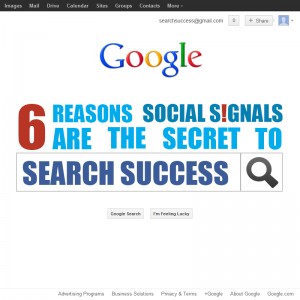When Google made the announcement that backlinks are no longer a major factor in search engine placement, other search engines such as Bing, were eager to jump on the bandwagon. Both major search engines are now measuring social signals when determining the placement that a website deserves in their search engine results.
In order for websites to become well known, they must gain popularity via social signals. Facebook likes, Twitter retweets as well as social engagement on Google + factor in for most of these social signals. It was only a matter of time before search engines discover that the relevance of a website can be effectively deducted by using real life opinions of people who visit and interact with those websites. It makes sense.
1) Social Signals Accurately Reflect Trust
Pages that have more likes and shares are more trustworthy than pages who don’t share these attributes. If multiple users find the page to be useful, then chances are that users who are using Google or Bing will find those pages useful as well. Sites have been able to game the system by using backlinks. This cheat allowed irrelevant pages to place higher than more useful pages, causing much user frustration. It’s not so easy to “game” social media sites and major search engine providers have begun to realize this.
2) Social Signals Enables Accurate SERP Personalization
There are some online activities that are accomplished easier when results are recommended. For instance, users who are searching for reliable webhosts may want to rely on the opinions and shares of others when finding the right provider. The number of recommendations and shares a page receives can leverage a site for a major position, especially if numerous individuals recommend a page. Search results consequently become more personalized, and better suited to meet their searcher’s needs.
3) Social Signals Can Guarantee Quality Content
No one enjoys wading through irrelevant results for hours on end. Searchers inevitably become frustrated when searches yield inaccurate results. By using user recommendations, shares, and likes on social media networks, major search engines have a better chance of offering users a better service by letting the users prescreen the sites. It’s a win-win situation for everyone involved.
4) Social Signals Boost Timely Content
Outdated links were always a problem. Users performing searches often come across sites that contain information that are either inaccurate or outdated. Content curation is a must now that social signals are on the scene, spurring page owners to produce updated content in order to rank higher. This is definitely a positive development.
5) Social Signals Facilitate Participation
Successful social businesses engage users and fans. Quality is increased and information is exchanged and shared more rapidly. By facilitating participation, search engines promote better results and everyone enjoys the benefits. When everyone is engaged, everyone wins.
6) Social Signals Boost Brand Development
Since companies must become more “socially involved” to rank higher and increase their odds of discovery, they are forced to develop their brands. SEO is no longer a major factor in budgeting; brand development through social media efforts is now taking the front seat. This is great for customers, but it’s also great for companies who must offer better services and let their customers know it through social media. This is great for search engines too, because now they can achieve better results as companies become more engaged. No one can afford to be passive anymore.
The world of online search is changing rapidly and there is little doubt that everything else will change along with it. Companies will see social signals in a brighter light and customers will too. In the end, it’s only a matter of how quickly companies can act on this to get the most out of it.
By Chak







